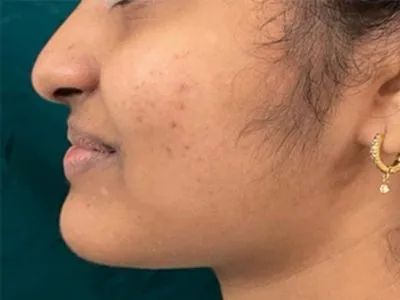Share a Smile
Oral and Maxillofacial Surgery
Oral and Maxillofacial Surgery is a specialized branch of dentistry that focuses on the diagnosis and surgical treatment of a wide range of conditions affecting the mouth, jaw, face, and neck. Additionally, It encompasses procedures such as teeth extractions, dental implants, corrective jaw surgery, and facial trauma or pathology treatment. Our Oral and Maxillofacial surgeon at Share A Smile Dental Clinic in Pandalam and Pathanamthitta is here to bring back your smile!
- Teeth Extraction
- Impacted Teeth Removal
- Facial Trauma Care
- Jaw Cyst and Tumours
- Jaw Deformities and Facial Aesthetic Surgeries
- TMJ and Orofacial Pain
- Oral Cancer Screening
- Lingual (tongue tie) and Labial Frenectomy
- Pre-prosthetic Surgeries
Teeth Extraction
At Our Dental Clinic in Pandalam and Pathanamthitta, The maxillofacial surgeons of Share A Smile performs teeth extractions with precision and care to ensure utmost patient comfort. Additionally, Our maxillofacial surgeon performs the extraction procedure, no matter how complex. We understand it is the most common procedure that gives nightmares to patients and dentists alike. Moreover, we strive to make it as simple and comfortable as possible. You can trust our dental clinic as you trust yourself!

Impacted Teeth Removal
The condition when a tooth or multiple teeth fail to erupt into the oral cavity even after the average eruption period is called impaction and needs surgical removal (mostly under local anesthesia). Additionally, the most common tooth/teeth that get impacted are wisdom teeth, followed by canine teeth. At Share A Smile, we will explain the procedure so you may know what to expect and make you as comfortable as possible.
TMJ and Orofacial Pain
Chronic pain is one of the most debilitating conditions a person may suffer from, and orofacial pain is one of these conditions. It can range from toothache to Temporomandibular Joint (TMJ) pain to Neuralgia pain. So, it may often get confused with another type of chronic pain, such as migraine, sinusitis, temporal headache, etc. Therefore, correct diagnosis is critical in such conditions since wrong diagnoses can lead to unwanted treatments.
Jaw Deformities and Facial Aesthetic Surgeries
Developing abnormal jaw growth can cause protruding chins, gummy smiles, inability to chew, tongue thrusting, sleep apnoea, and lisping. Therefore, camouflage treatment can control and manage the deformity without surgery with the right intervention. If the deformity is too obvious and extensive, it’s better to have a maxillofacial surgeon and orthodontist work together.


Jaw Cyst and Tumours
Like any part of the body, the mouth and face may have different types of pathological growths, most benign. So, simple excision under local or general anesthesia can treat them. Jawbones are unique in the presence of teeth, and so are the types of cysts, tumors, and other pathologies that affect them; they need specialized management by experts to minimize the damage to the normal tissues, prevent loss of teeth, and reduce the risk of recurrence. Here, we have a competent team willing to do the same for you in case of an unfortunate incident.
Facial Trauma Care
Maxillofacial trauma may vary from simple tooth loss during a fall to pan facial injuries and fractures due to road traffic accidents. Therefore, a team of doctors at Share A Smile and associated hospitals provides a thorough multi-specialty intervention and a wholesome approach, which is needed for their treatment. Additionally, We can help you with fracture fixation, fixed replacement of lost teeth, minimal scar suturing, and scar revision.
Lingual (tongue tie) and Labial Frenectomy
Frenum is a fibrous band-like structure that forms an attachment to jaw bones from lips, cheeks, or tongue. However, when they elongate with higher attachments to bone, they create spacing between teeth and result in speech difficulties in the tongue. Therefore, when done at the right time, simple surgical excision with adjuvant treatments can improve speech and aesthetics noticeably.
Oral Cancer Screening
Many lesions in the mouth may mimic cancer and can cause serious worry for patients and families alike. Our maxillofacial surgeon at Share A Smile Dental Clinic In Pandalam and Pahanmathitta can help you differentiate between them and perform a biopsy under local anesthesia to reach the correct diagnosis. Also, we can guide you about the right course of treatment for your condition as relevant. Choosing a right dental clinic for treatments related to teeth can improve the overall quality of a person’s life.
Frequently Asked Questions
What conditions are treated in oral and maxillofacial surgery?
Oral and maxillofacial surgeons treat conditions such as impacted wisdom teeth, jaw misalignment (orthognathic surgery), facial trauma, oral cancer, temporomandibular joint (TMJ) disorders, cleft lip and palate, and more
Do I need a referral to see an oral and maxillofacial surgeon?
- Sometimes, a referral from a general dentist, physician, or another healthcare professional may be necessary. However, many oral and maxillofacial surgeons also accept direct appointments, so you can contact them without a referral if you suspect you have a condition that requires their expertise.
What is the process for wisdom teeth extraction?
- Wisdom teeth extraction is a standard oral surgery procedure. The surgeon will typically evaluate your teeth using X-rays, discuss the procedure and anesthesia options, and schedule the surgery.The surgeon removes impacted or problematic wisdom teeth during the procedure and provides you with post-operative care instructions.
Is oral and maxillofacial surgery painful?
- The level of discomfort or pain varies depending on the specific procedure and your pain tolerance. Surgeons typically perform most oral and maxillofacial surgeries under anesthesia, ensuring you won’t feel pain during the process. However, there may be some post-operative discomfort, which can be managed with pain medications.
How long is the recovery time after oral and maxillofacial surgery?
- Recovery times vary depending on the procedure and the individual’s healing abilities. Generally, you can expect a few days to several weeks for a full recovery. Your surgeon will provide you with detailed post-operative instructions to follow.
What are the risks associated with oral and maxillofacial surgery?
- All surgical procedures carry some risks. Common risks include infection, bleeding, swelling, and discomfort. Your surgeon will discuss these risks with you and take measures to minimize them.
Are there non-surgical alternatives to oral and maxillofacial surgery for certain conditions?
- In some cases, non-surgical options, such as orthodontic treatment or physical therapy, may be considered as alternatives to surgery. Your oral surgeon will evaluate your condition and recommend the most appropriate treatment.
Will I need to have anesthesia during oral surgery?
Anesthesia is commonly used during oral and maxillofacial surgery to ensure the patient’s comfort and safety. Your surgeon will discuss the type of anesthesia best suited for your procedure: local anesthesia, conscious sedation, or general anesthesia.
How can I prepare for oral and maxillofacial surgery?
- Your surgeon will advise pre-operative instructions, including fasting if needed before surgery, adjusting medications, and arranging for someone to drive you home afterward. Follow these instructions closely to ensure a smooth surgery.
What should I expect during the consultation with an oral and maxillofacial surgeon?
- During the consultation, the surgeon will discuss your medical history, perform a thorough examination, and explain the recommended treatment plan. You should also use this time to ask any questions or express any concerns you may have.
